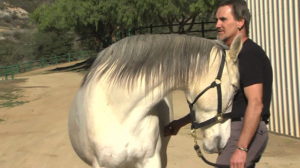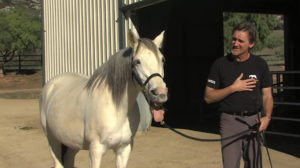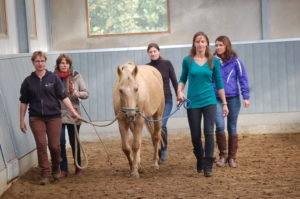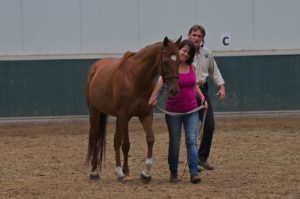What is EAPD?
In EAPD ~ equine assisted personal development ~ Chris Irwin facilitates students on how to lead horses with Insights that integrate “horse sense” into practical and essential life skills.
 Psychologists estimate that authentic communication between people is 90% body language. Based primarily on body language, horses need to see the same reliable qualities in their herd leaders that people need to develop for ourselves.
Psychologists estimate that authentic communication between people is 90% body language. Based primarily on body language, horses need to see the same reliable qualities in their herd leaders that people need to develop for ourselves.
EAPD is a paradigm shift experience in conscious awareness. Participants learn how to communicate respectfully and consistently with their personal core – their primal energy – so that self-assurance balanced with empathy is expressed through non-verbal behavior.
Click here to read about EAPD Courses
In learning to evolve and be who horses need us to be we can:
 Work through anxiety and frustration to achieve respect, trust, focus and willing participation in relationships.
Work through anxiety and frustration to achieve respect, trust, focus and willing participation in relationships.- Develop awareness for distinctions between reality- illusions.
- Give clear supportive feedback, encouragement, and realistic praise to establish mutually advantageous relationships.
- Apply the process of learning to connect with and lead the vulnerability of horses into resilient leadership of Self in body, mind, spirit, family, community, workplace relationships and our natural environment.
What EAPD is Not
The goal in many “equine assisted programs” in the personal coaching world is to use interactive exercises, or “games” with horses, as a form of experiential therapy or personal development for people. And yet, there is much concerned debate in this emerging industry about the well being of the horses that are being “used” in equine assisted practices.
 We see a disturbing trend where the majority of practices seem to be based in setting both the horse and human up for failure. The person receives no meaningful coaching on how to appropriately approach or be with a horse and it soon becomes clear that the goal is to see how the client reacts to stress, performance anxiety, and, most often, failure. Does the person become frustrated, frightened, angry, do they blame “the stupid horse”? Does the person shut down and withdraw, becoming sullen, do they try to bribe or coerce the horse, and are they willing to ask for help?
We see a disturbing trend where the majority of practices seem to be based in setting both the horse and human up for failure. The person receives no meaningful coaching on how to appropriately approach or be with a horse and it soon becomes clear that the goal is to see how the client reacts to stress, performance anxiety, and, most often, failure. Does the person become frustrated, frightened, angry, do they blame “the stupid horse”? Does the person shut down and withdraw, becoming sullen, do they try to bribe or coerce the horse, and are they willing to ask for help?
Too often, the horse is used as a catalyst to provoke human emotions so that therapists can make the metaphorical leap from relations with horses to relations with people. “Ah-hah”, asks the therapist, “Is this how you react at home with the kids, or with your spouse, or is this similar to how you deal with conflict and control issues in the workplace?”
 When it comes to the personal challenges involved in communicating with horses, people struggle with a myriad of personal issues and challenges that rise to the surface during the experience. However, with a focus on recognizing that horses are complicated sentient beings whose respect, focus, trust and willingness can and should be earned by the consistent integrity of our actions, then the client has stepped into a learning experience that requires evolving and maintaining an admirable list of essential life skills.
When it comes to the personal challenges involved in communicating with horses, people struggle with a myriad of personal issues and challenges that rise to the surface during the experience. However, with a focus on recognizing that horses are complicated sentient beings whose respect, focus, trust and willingness can and should be earned by the consistent integrity of our actions, then the client has stepped into a learning experience that requires evolving and maintaining an admirable list of essential life skills.
The best lessons learned from horses are those that involve our realizing that we need to adapt our predator basis of human behavior to be more aligned and cooperative with the nature of the prey animal in the horse. We learn to balance essential life skills such as awareness with focus, patience with decisiveness, sensitivity with assertiveness, and boundaries with receptivity, all while building upon a foundation of consistency, clarity, compassion, calm, confidence, and an ability to multi-task.
Click here to read about EAPD Courses
“To teach a horse to be calm, responsive, trusting and brave, you must first acquire those qualities yourself. You can’t just appear to be confident and in control. You must let go of your masks and conflicts and fears and BE confident and in control. Everything we can teach a horse, we can teach ourselves. And you may discover that when a horse sees you relaxed, balanced and centered, so does everyone else. In and out of the horse arena.”
Chris Irwin – from Horses Don’t Lie